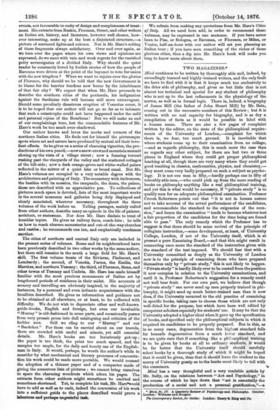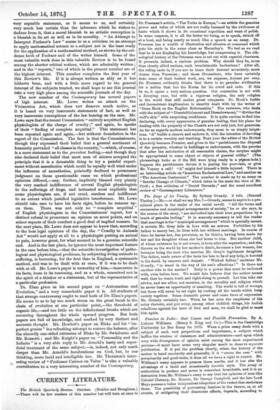TWO MAGAZINES.* Mind continues to be written by thoroughly able
and, indeed, by exceedingly learned and highly-trained writers, and the only fault we have to find with it is that it keeps much too exclusively to the drier side of philosophy, and gives us but little that is not almost too technical and special for any student of philosophy who is not up to the last refinements in the physiology of the nerves, as well as in formal logic. There is, indeed, a biography of James Mill (the father of John Stuart Mill) by Mr. Bain, coming out in the successive numbers of this Review ; but it is written with no real capacity for biography, and is as dry a compilation of facts as it would be possible to label with a human name. There are also a few pages of complaint written by the editor, on the state of the philosophical require- ments of the University of London,—complaint for which there is, we fear, too much ground. It is inevitable that where students come up to their examination from no college, —and as regards philosophy, this is much more the case than as regards any other subject, for there are but two or three places in England where they could get proper philosophical teaching at all, though there are very many where they could get good teaching in classics, mathematics, physics, and chemistry,— they must come very badly prepared on such a subject as psycho- logy. It is not one man in fifty,—hardly perhaps one in fifty of tolerably able men,—who could pick up from the mere reading of books on philosophy anything like a real philosophical training, and yet this is what would be necessary, if "private study" is to qualify men for an adequate philosophical examination. Professor Croorb Robertson points out that "it is not in human nature not to take account of the actual performance of the candidates, and accommodate the standard to the exigencies of the occa- sion," and hence the examination "tends to become whatever test a fair proportion of the candidates for the time being are found able to pass." The only remedy which the Professor has to suggest is that there should be some revival of the principle of collegiate instruction,—some development, at least, of University College, London, if not of the University itself, which is at present a pure Examining Board,—and that this might result in connecting once more the standard of the instruction given with the standard of the test imposed. We should fear that with a University committed as deeply as the University of London now is to the principle of examining those who have prepared themselves only by "private study," this is not likely to happen. "Private study" is hardly likely ever to be ousted from the position it now occupies in relation to the University examinations, and until it is, Professor Robertson's suggestion for a remedy could not well bear fruit. For our own part, we believe that though "private study" can never send up men properly trained in phi- losophy, it might send up much better-trained men than it now does, if the University recurred to the old practice of examining in specific books, taking care to choose those which are not only well-fitted for the purpose, but which have been well edited by competent scholars especially for students' use. It may be that the University adopted a higher ideal when it gave up the specification of books, and specified only the philosophical subjects in which it required its candidates to be properly prepared. But in this, as in so many cases, degeneration from the highest standard falls far beneath degeneration from a much lower standard, and we are quite sure that if something like a phi!osophical training is to be given by books at all to ordinary students, it would be far better that the University itself should carefully select books by a thorough study of which it might be hoped that it could be given, than that it should leave the student to the mercy of University gossip as to the books most likely to tell with the examiners. Ns'
Mind has a very thoughtful and a very readable article by Mr. Sully, on the relations between "Art and Psychology," in the course of which he lays down that "art is essentially the production of a social and not a personal gratification,"—a • Mind, No. IV. A Quarterly BOTieW of Psychology and Philosophy. October. London: Williams and Norgate.
271E Contemporary Review, for October. London: Henry B. King and 0o.
very arguable statement, as it seems to us, and certainly very much less certain than the inference which he wishes to deduce from it, that a moral blemish in an artistic conception is a blemish in its art as well as in its morality. "An Attempt to Interpret Fechner's Law" seems to us a criticism on an attempt to apply mathematical science to a subject not in the least ready for the application of a mathematical method, as shown by the evi- dence both of Fechner and of the writer himself. Some of the most valuable work done in this valuable Review is to be found among the shorter critical notices, which are admirably written ; and in the "reports," two of which in the present number are of the highest interest. This number completes the first year of this Review's life. If it is always written as ably as it has hitherto been, and with a little more regard to the general interest of the subjects treated, we shall hope to see this journal take a very high place among the scientific journals of the day.
The new number of the Contemporary has several papers of high interest. Mr. Lowe writes an attack on the Vivisection Act, which does not deserve much notice, as it is based on very inaccurate statements of fact, as well as very inaccurate conceptions of the law bearing on the case. Mr. Lowe says that the recent Commission "entirely acquitted English physiologists of the charge of cruelty ;" and again, he speaks of their "finding of complete acquittal." This statement has been repeated again and again,—but without foundation in the report of the Commission. The fact is that the Commissioners, though they expressed their belief that a general sentiment of humanity pervaded "all classes in the country,"—which, of course, is a mere statement as to the prevalent feeling,—and though they also declared their belief that most men of science accepted the principle that it is a detestable thing to try a painful experi- ment without anaesthetics which could be equally well tried under the influence of anmsthetics, pointedly declined to pronounce judgment on those questionable cases on which professional opinions differed,—nay, further, implicitly blamed very plainly the very marked indifference of several English physiologists to the sufferings of frogs, and intimated most explicitly that some physiologists are, if not cruel, careless and indifferent to an extent which justified legislative interference. Mr. Lowe should take care to have his facts right, before he reasons up- on them. There was not only no "complete acquittal" of English physiologists in the Commissioners' report, but a distinct refusal to pronounce an opinion on moot points, and on minor aspects of their conduct a good deal of implied censure. In the next place, Mr. Lowe does not appear to know that, according to the best legal opinions of the day, the "Cruelty to Animals Act" would not apply at all to a physiologist putting an animal to pain, however great, for what seemed to be a genuine scientific end. And in the last place, he ignores the most important feature in the case before him,—that the scientific investigation of patho- logical and physiological problems, by subjecting living animals to suffering, is becoming, for the first time in England, a systematic method, and was to be dealt with at once, if it was to be dealt with at all. Mr. Lowe's paper is unworthy of him,—inaccurate in its facts, loose in its reasoning, and as a whole, conceived not in the spirit of a thinker or a statesman, but of the representative of a particular profession.
Dr. Elam gives 1113 his second paper on "Automatism and Evolution," and a very remarkable paper it is. All students of that strange controversy ought to read both of Dr. Elam's papers. He seems to us to lay too much stress on the great break in the chain of evolution at one particular point,—the threshold of organic life,—and too little on the infinitesimal breaks which are occurring throughout the whole upward progress. But both papers are full of knowledge, and marked by very distinct and accurate thought. Mr. Hewlett's paper on Blake and his "im- perfect genius" is a refreshing attempt to restore the balance, after the absurdly one-sided estimates of Blake by Mr. Swinburne and Mr. Rossetti ; and Mr. Knight's paper on "Personality and the Infinite " is a very able reply to Mr. Arnold's hasty and super- ficial treatment of the same subject,—is, indeed, not only much deeper than Mr. Arnold's lucubrations on God, but, to our thinking, more lucid and intelligible too. Mr. Thornton's inter- esting review of "Professor Cairnes on Value" is also a valuable contribution to a very interesting number of the Contemporary.



































 Previous page
Previous page